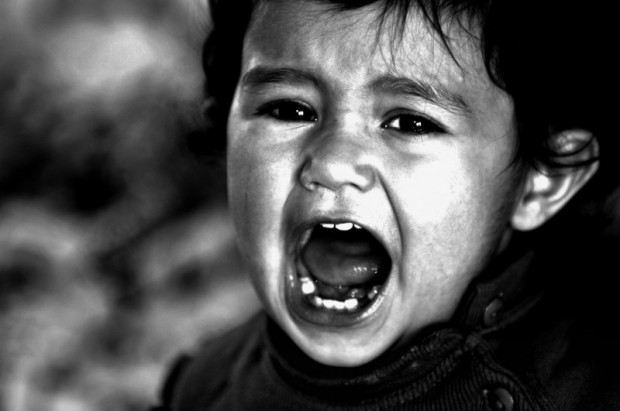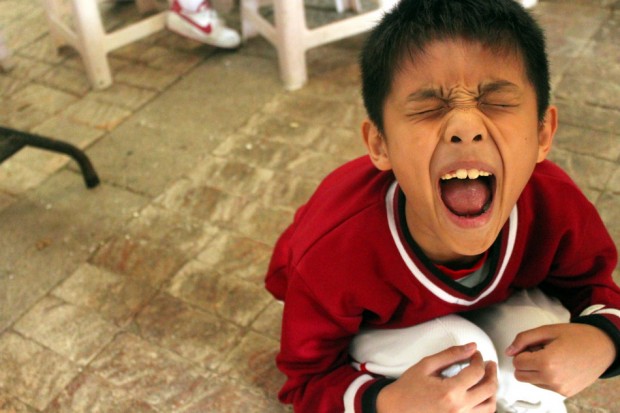I used to greatly enjoy my private time. But having an energetic 3-½-year-old boy has challenged me to understand mindfulness in a new context. Life with children doesn’t allow loads of time to pray and meditate. And kids usually don’t have the attention span to sit down for a conversation about the merits of virtuous behavior.
Instead I’ve learned that being a spiritual parent often means simplifying and improvising. And even when our kids aren’t behaving exactly as we’d like, there are ways to spiritually recenter.

The Baha’i writings explain that educating children is one of the most significant things we can do. However, education more than just book learning; the most significant education is spiritual.
Numerous quotes describe the need to raise children to exhibit good character and conduct. But how exactly do we achieve this? Parents want the best for our children but in the crossfire of everyday life, it can feel impossible to attain these ideals.
‘Abdu’l-Baha offers a clue about how we should raise children:
“Whensoever a mother seeth that her child hath done well, let her praise and applaud him and cheer his heart; and if the slightest undesirable trait should manifest itself, let her counsel the child and punish him, and use means based on reason, even a slight verbal chastisement should this be necessary. It is not, however, permissible to strike a child, or vilify him, for the child’s character will be totally perverted if he be subjected to blows or verbal abuse.” –Selections from the Writings of ‘Abdu’l-Baha, p. 125
Clearly, we should favor positive parenting methods over punitive ones. But how do we address undesirable behavior in a loving and spiritual way? Our children won’t always manifest good behavior like we’d hope. Virtues and appropriate conduct need to be cultivated slowly and patiently.
For, as ‘Abdu’l-Baha says, “Children are even as a branch that is fresh and green: they will grow in whatever way ye train them.” —Selections from the Writings of ‘Abdu’l-Baha, pp. 135-36
I’ve discovered a few small steps to help translate these Baha’i teachings into reality. So when crankiness is on the rise, tempers flare, or a meltdown is on the horizon, here are a few tools to keep in your back pocket.
Pause

So simple and yet so easy to forget. If your child is acting out—throwing toys, screaming, slamming doors, ignoring instructions— the best way to not react with anger… is to pause.
Take a deep breath, count to five, say a quick prayer—anything to calm down right then and there.
Assess Feelings
Take time to think about your feelings—and your child’s. In moments of stress, we can revert to the child-rearing methods our own parents used, which we may not want for our children. Rather than regret an argument later, acknowledge how you feel and slow down that rush of frustration.
Thinking about how your child is feeling can help you to understand their behavior. Does he feel ignored and need attention? Or maybe he’s just tired and hungry and hasn’t yet learned how to express those needs calmly. It’s our job as parents—and community members—to help them build these communication skills in a calm and loving manner.

Ask Questions
Ask your child what’s going on. Don’t ask, “Why would you do that? What were you thinking?” Instead try something like, “I see that you threw your trains across the room. You must be feeling upset. What’s your plan? How can we fix this?”
Rather than just scolding her, making your child think about why she’s acting out can help resolve the situation. It gives her a chance to think about her feelings and to try to piece together logical steps to change the situation.
This doesn’t always mean she will suddenly do exactly what you want her to do, but it gets her to stop and think. This can help children begin to consider consequences without focusing solely on punishment.
Discipline
If discipline is necessary, I’ve found it is best to act quickly, follow through, and detach. Different parents have different ways of doing this. Maybe it’s a time out in a child’s room, taking away a privilege like watching TV or getting dessert, taking away a toy that’s causing problems, or maybe just sitting down for a minute to talk.
Whatever the method, disengaging from a child’s reactive behavior can help to smooth out the situation. Getting into arguments or long negotiations seems to prolong the undesirable behavior and allows frustration and stress levels to rise. Setting boundaries in a calm and detached a manner can help you and the child move past the situation swiftly and smoothly.
Focus on the Positive

Whenever possible, focus on the positive and link good behavior to virtues. Instead of constantly saying “no,” “don’t,” or “stop,” point out instances when a child is displaying behavior that you like. When you can focus on the good behavior, it helps to reenforce it.
And good things can come in small packages. Praise a child for waiting quietly in line, following directions without complaining, accomplishing something on their own for the first time, sharing with friends, or coming up with something nice they want to do for someone else.
And relating this praise to helpfulness, generosity, and compassion will help them see that they possess each of these qualities, even if they don’t behave perfectly all the time. Some children might benefit from a reward system, like a good behavior chart, to point out the times they are showing virtues.
So there you have it—five simple steps to try to be a more mindful, spiritually-oriented parent. This isn’t a no-fail recipe for how to be a perfect parent. They’re just some steps that have helped me to stay calm and centered.
But parenting, along with growing up, is a long learning process. And different parents might have other practical tips that work for them. So share your thoughts below! What has helped you to be a more mindful parent?
Want more ideas on parenting? Check out:
Girls Will Be Girls – Cool Mommas Raising Daughters
4 Easy and Impactful Ridvan Ideas for Kids
thanks for the commentary!
It’s getting harder and harder to be a parent, when society is deteriorating at an increasing rate. Things that we never thought about are acceptable now. Kids have many more negative influences than when I was raising mine in the 1980’s. It calls for more vigilance, and help from grandparents, friends, and others you can trust.
I have a 1-year-old who is learning to walk and is therefore very squirmy when laying down to change his diapers. I often ask him to “wait, please” when he tries to roll away before we’re finished. I had been thinking about the phrase from ‘Abdu’l-Baha that “Whensoever a mother seeth that her child hath done well, let her praise and applaud him and cheer his heart” and realized that, after I ask him to wait, I should not just ignore his compliance when it happens. Now, after I ask him to wait, if stays still, or if he starts roll but pauses, I respond enthusiastically and with a smile and say “good waiting!” or “thank you for your patience!” or something to that effect. The most rewarding thing from this is seeing the smile that such immediate praise evokes — I can see that it has indeed cheered his heart! I think because it helps him develop an awareness of making an effort to obey and succeeding at that. I won’t claim it’s greatly reduced the behavior itself too much (though it has definitely helped some) but it’s definitely alleviated my frustration as a parent about it, because it causes me to focus on where he’s at in his process of spiritual education, rather than just my own needs (e.g. he’s learning to be patient, vs I just need him to lay still).
Thanks for sharing, Katlin! Your story is so encouraging to read.